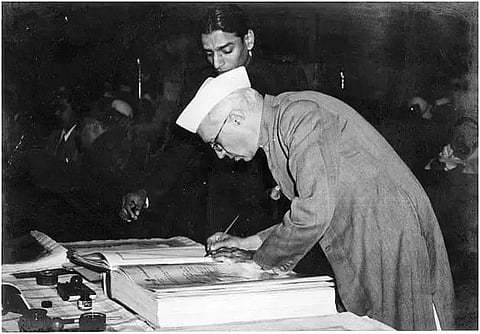
- Home
- Live Blog
- Breaking News
- Top Headlines
- Cities
- NE News
- Sentinel Media
- Sports
- Education
- Jobs

Arup Saikia
(arupsaikia07@gmail.com)
Since the appearance of digital platforms, it’s said that new generations are gradually becoming averse to physical book reading. Habit is habit. The nature of any living being never changes fundamentally. Whenever writing materials of tree bark or some others were invented in the Roman Empire, some scholars of good memories with oratorical skills worried for their profession. Then they were substituted for books. But the demand for remembering quality or public speakers remained the same until today. Only the social environment has changed. The same phenomenon is applicable to the existence of books in different formats—online or offline.
A sincere reader or bookworm never loiters in a wine shop or theatre for a longer period of time. It’s quite natural that a particular reader may be partially addicted to something else, but that addiction never lasts long. Biologically, the inherent nature only moulds or creates a society in the human as well as animal kingdoms.
As far as bibliophilia is concerned, no other example is more adequate than that of Lt. Jawaharlal Nehru, the first prime minister of India. Being an avid reader and inquisitive writer, Pandit Nehru naturally had to absorb himself in books in addition to materialising his other habitual nature. Writer Khushwant Singh was a press attaché, and Krishna Menon was an Indian high commissioner in the UK in the early 1960s. Prime Minister Nehru landed in London to participate in a Commonwealth conference. Nehru, after refreshing in a hotel for a short time, arranged a meeting with Edwina Mountbatten, wife of Louis Mountbatten, in the post-midnight hours in a restaurant. The time was around 2 a.m., as far as I remember from the cordial public interaction of the late Khushwant Singh in Delhi. The restaurant was located in Soho, London, a famous area for nightlife. The restaurant owner recognised our PM and clicked their photo, which was published in the “National Herald” the next day. Prime Minister Nehru had to face an unpleasant situation due to the leakage of their meeting. The job of Khushwant Singh as media coordinator was in trouble for the publication of the Nehru-Edwina photo together. Anyway, that was a different topic.
Now let’s discuss the first preference, addiction, or love of anyone. Nehru was a genuine bibliophile. His itinerary was on a very tight schedule. The meeting of the Commonwealth was fixed for the early hours of the next afternoon. And in the morning hours, he was scheduled to visit some bookshops on Oxford Street in London. Therefore, Nehru couldn’t spare long book shopping time for Edwina. As an eyewitness, writer Khushwant Singh later wrote in Illustrated Weekly during his editorship. Nehru first picked up a book by Irish writer George Bernard Shaw. It’s worth mentioning that Bernard Shaw died only a few years ago. Nehru’s fascination and eagerness for knowledge dictate that he read or buy the books of Shaw.
Finally, we can say that Nehru’s bibliophilia prevailed over his short-term meeting with Edwina Mountbatten. Therefore, the fascination, love, or attraction of people will remain the same for knowledge-feeding material like books, which may be in a transitional form. Only interest matters.